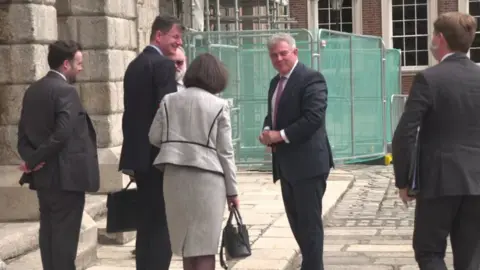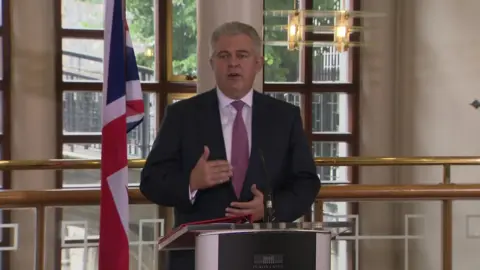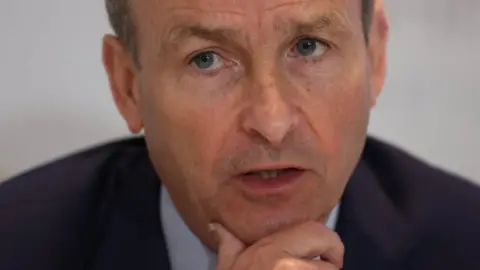NI legacy 'engagement' needed, agree UK and Ireland governments
The British and Irish governments have agreed "a process of intensive engagement" is needed in Northern Ireland on legacy issues.
The agreement came after a meeting of the British-Irish Intergovernmental Conference (BIIGC) on Thursday.
It is a body set up to promote cooperation between the UK and Ireland and brings together representatives from both sides of the Irish Sea.
NI Secretary Brandon Lewis described the meeting as "hugely important".
He met with Irish Foreign Minister Simon Coveney and Justice Minister Heather Humphreys, at the BIIGC's first meeting in two years.
Northern Ireland Minister of State Robin Walker was also in attendance.

Simon Coveney described the decision on legacy issues as "the most substantive" taken at Thursday's meeting.
"We have in place the Stormont House Agreement, which is now quite a number of years old," said Mr Coveney.
"There is concern amongst some that the Stormont House structures aren't as comprehensive as needed to deal with legacy in a way that will work for victims and their families and for Northern Ireland on the road to reconciliation.
"The two governments have now agreed to move a process forward together, in partnership, to reach out to families of victims, to political parties in Northern Ireland and other stakeholders to talk about the way forward."
Mr Coveney said the discussions would be "open-minded" and not have "any predetermined outcome".
"This isn't something we're talking about managing for months and months and months, we're going to move this ahead quickly," he added.

Mr Lewis said the legacy of Northern Ireland's past was a "hugely complex and sensitive issue".
"We've got to work together to do everything we can to help Northern Ireland move forward and find a way to move on in dealing with issues around legacy," he said.
"The principals of Stormont House are principals we want to build on and develop, but over the last seven years there are lessons about what we can do and how we can do that."
Sinn Féin's Gerry Kelly, however, said the Stormont House Agreement cannot be changed without the consent of all parties who signed up to it.
"The agreement contained important mechanisms on dealing with the past which were designed to meet the needs of all victims of the conflict," he said.
"The British government has sought to renege on those commitments since then and are again acting in bad faith by trying to review or rewrite the Stormont House Agreement. The Irish Government should not be party to such action.
"This is unacceptable. Agreements made need to be implemented. There can be no ambivalence or double-speak."
He said he will be seeking urgent meetings with both the British and Irish governments on the issue.

Analysis: No detail yet on what's to come
Today we got a sense of where the two sides are coming from.
Simon Coveney made it very clear that, as far as the Irish government is concerned, the Stormont House Agreement is still the starting point when it comes to legacy issues but the Irish government accepts that the British have a different perspective on this.
Brandon Lewis was saying that Northern Ireland needs to move on and it's not going to move on because the current arrangements, he said, aren't working for people who've been seeking information about what happened to their loved ones over 50 years ago.
There was no detail about what mechanism the "process of intensive engagement" will take.
Both governments have indicated they want it to happen sooner, rather than later, but in terms of the hows, whens, wheres and whys - we have no idea.

The BIIGC was designed as part of the Good Friday Agreement and promotes bilateral cooperation between the two states in all areas of mutual interest, including security.
World Cup bid discussed
"From our perspective the BIIGC is a really important institution of the Good Friday Agreement," said Simon Coveney after the meeting.
"It is the structure that allows the British and Irish governments to work together on issues of mutual interest and concern.
"We are committing from today to ensure that it happens much more regularly - a number of times a year - so that it's not seen as an exceptional measure to deal with exceptional problems."
Numerous other issues were discussed at the conference, including Brexit and east-west relations and the recovery from the Covid-19 pandemic.
A joint UK and Ireland bid to host the 2030 football World Cup was also discussed at the meeting.
A date has been set for the BIIGC's next meeting in early November.
"We looking forward to hosting Simon and [his] contingent later this year in London," said Mr Lewis.
Brexit impact
Relations between the UK and Ireland have deteriorated because of the fall-out from Brexit, with sources in Dublin indicating it was hoped that Thursday's meeting could re-heat relations.
Unionists have objected to the Northern Ireland Protocol that has created a trade border in the Irish Sea for certain goods such as sausages and chilled meats arriving from Great Britain.
Northern Ireland has remained aligned with the EU single market for goods, while the rest of the UK has left.
The Irish government believes that an agreement on animal and plant standards would get rid of up to 80% of all checks but the UK is reluctant to align to EU rules, preferring equivalence.
 PA Media
PA MediaOn Wednesday in the Dáil (Irish lower house of parliament), Taoiseach (Irish prime minister) Micheál Martin stressed the importance of the British government working with the European Union to find a breakthrough on the protocol.
In the past, the UK has unilaterally extended grace periods to allow for a Brexit transition for businesses.
That annoyed the EU, but the UK has formally sought another extension which sources say is likely to be granted.
Mr Martin also called for space to allow the incoming leader of the Democratic Unionist Party (DUP), Sir Jeffrey Donaldson, to deal with issues.
He told the house that the opportunities arising from the protocol in areas such as foreign direct investment and the dairy industry should be identified and highlighted.
